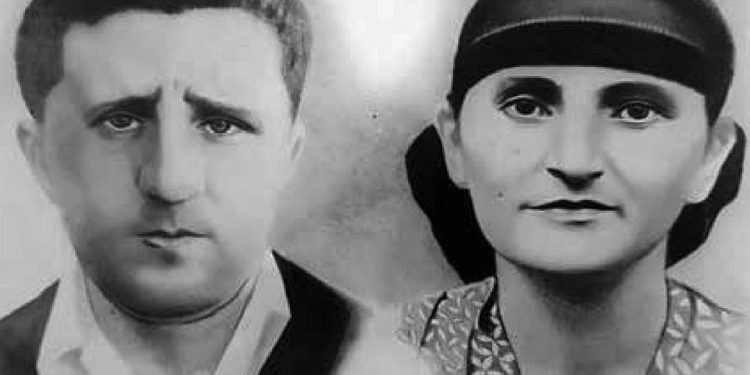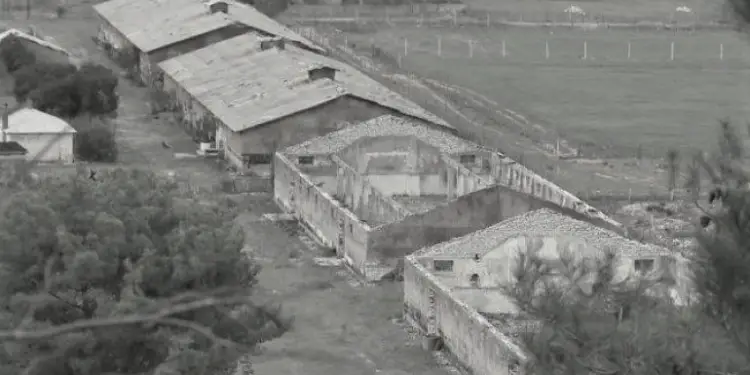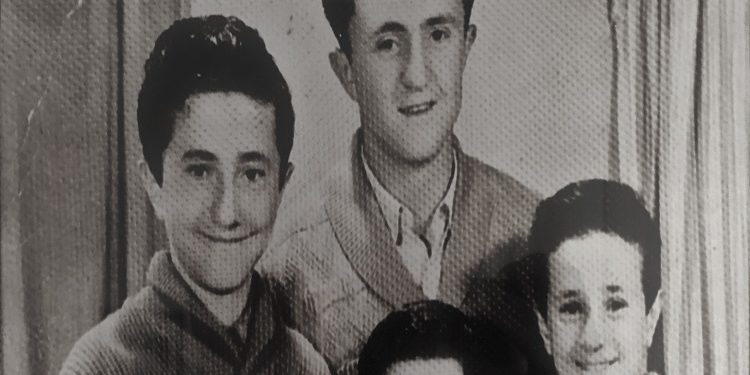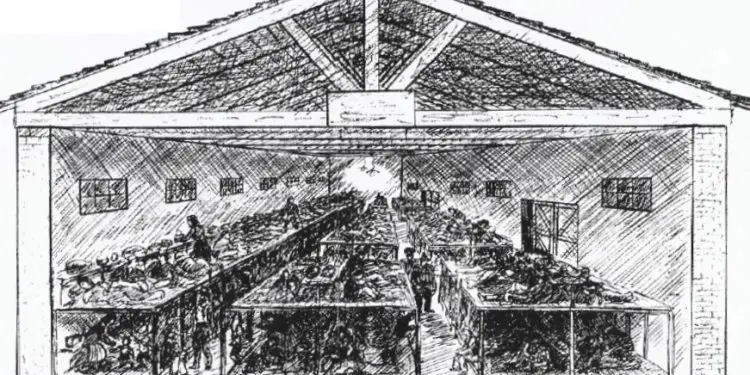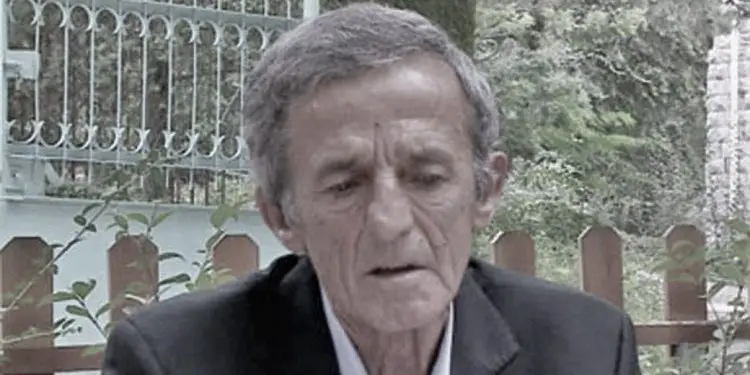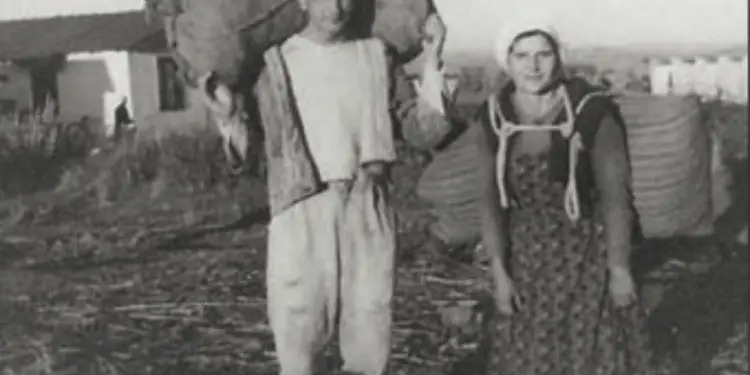By Mira Tuci
Memorie.al / My name is Seit Fadil Petrela, born September 25, 1947. I have passed 75 years. The father, Fadil Petrela, was the son of Selman Aga Petrela. My mother’s name was Juma Petrela Kupi, the daughter of Abaz Kupi. Immediately after the liberation, with a testimony from the Ministry of Justice, which we have, it is confirmed that on December 4, 1944, that is, 5 days after the date of “liberation”, November 29, 1944, my father was arrested, and the trial took place in August-September 1946: He was sentenced to 2 years in prison. Father was released from prison in 1946. In this period of joy after returning from prison, it was my fate to be born in September 1947. But neither the joy of being released from prison, nor the joy of the birth of another child, did not last long, because in January 1949, because of this family biography, this family background, we were interned in the fortress of Berat. There were also many other interned families. The government of that time was not satisfied with the prison for the father, but sentenced the whole family to exile.
I was a little over 1 year old, so I am not an eyewitness of the event, but there are many documented events and other irrefutable tragic facts such as death, which do not need to be proven by eyewitnesses.
We stayed in Berat until May 13, 1949. On May 13, 1949, late at midnight, a motorcade arrived with many vehicles, trucks, and according to a decision, all the internees in Berat, Kuçovo, etc., would to concentrate on the infamous Tepelena camp. On the way from Berat to Tepelena, following the mountain road from Ure e Gorica that continues to Këlcyre, one of the cars that were in the motorcade, at dawn on May 14, 1949, fell into the abyss. My parents lost their lives in this car accident.
In those circumstances, since it was night, it was a journey to the camp, with many difficulties, as the eyewitness members of this painful event testify, with circumstantial means, as also proven in a court decision held in 1994, to testify for this fact that happened, the burial or burying of my parents was done by circumstantial means. Someone said an expression: “We opened the graves with pot lids”, not having the necessary tools for that job.
After this rite was performed, the motorcade continued on its way and we ended up in Tepelena. In the car with us were my grandmother and aunt, my father’s sister, who was an old girl, but still unmarried, so it was said that she was part of the parental family with her brother. So she was sentenced along with the whole family.
As a result of the accident, the grandmother suffered a spinal cord injury and was taken to the hospital in Gjirokastra, where she was left unconscious. My aunt suffered a severe nervous shock from the tragedy that struck the family and suffered all her life from such worries. Until the end of her life, 6-7 years ago, she was afraid to get into the car.
Only we, 4 children and aunt arrived from my family in Tepelena. They buried their parents on the street, but as children, growing up and understanding, we were tormented by the thought of where our parents’ graves were. The elder brother, Bujari, who became both father and mother to me, that is, everything, with his initiative, since he remembered something, fixed the appearance of the country. There was only one stone on those graves as a marker.
We had the unquenchable desire to find the place where our unfortunate parents rested, who also left us in the middle of exile, but we were very young and without any support. Around 1971 or 1972, for our benefit, a resident of that area, to whom we are grateful for life, informed us that new lands were being opened in the area where the accident had occurred and where our parents were buried and, from this thing, the grave markers would disappear.
Then, the brother and a friend of his, who we cannot find words to thank forever, went at night, found the grave, took out the remains of the parents from the grave and brought them home. For a long time, we kept the remains of our parents at home, because of course, at that time, the possibility of a legal burial was also impossible, because they were still convicted (!).
With the opportunity of a friend of ours who was working at the cemetery at the time, we buried them to have a sign forever, without putting the name on top, as is customary, so without anyone knowing what that grave was. Later, as time went by, we improved the tomb a bit, until the time came when it became legal for them to have a tomb with their names on it. Today, my parents rest next to each other, with us tending those graves.
The elder brother, who is everything to me, is called Bujar, born in 1938, the second brother, Ylberi, born in 1942, the third brother, Halili, is 74 years old; I’m over 70, approaching 75.
The truth is that I was in the Tepelena camp at an age when I didn’t understand anything. Even my older brother, Bujari, was very small. When I wanted to learn something more about the smallest and most unfortunate person in this disaster, I couldn’t get it out of his mouth.
He was at an age where he understood the death of his parents, the accident of his grandmother; he understood that we were suddenly left with only 4 orphaned children, in the middle of a camp with internees, 4 children, one of whom was almost a baby among a crowd of internees! What more should I say? Were we at fault? The brother has suffered a deep shock, that’s why he doesn’t speak, his heart doesn’t beat. He was the one who took care of us.
Then, we stayed in the Tepelena camp for only two weeks or so, because even the leaders of the camp found it impossible to take care of 4 orphans. Our grandmother, my mother from my father’s side, was paralyzed in the hospital; my father’s sister suffered a nervous breakdown. I think that, for so long, all those people who knew us, have taken care of us as much as they could.
We were taken into custody by my father’s uncle, Gani Petrela, he was given the right by the authorities, not that he did it, he had the will, but he didn’t have many opportunities. We came to Tirana to my father’s uncle, but he also had his share of misfortune. Even my paternal uncle, Gani Petrela, was sentenced to prison from 1951; He was sentenced for not reporting his brother, that is, my grandfather, who continued to be convicted since 1945, but in fact he had been hiding in a cave with a friend of his from Zall Herri for 6 years.
When it was known that my grandfather was alive, then they also punished his brother, that is, my father’s uncle, for not reporting his brother to the authorities. The grandfather’s brother was sentenced to 12 years; he served 10 years. He was released in 1962. Apparently he had been very ill in prison, because he lived only 1 month after his release and died.
This is how our life passed under the guardianship of relatives, aunts, my father’s two sisters, my people in Lushnje, who at that time were interned in Lushnje, Gradisht, Grabian, Savër, Plow camps. We spent part of our lives there.
From my father’s family, my father and my father’s uncle, the one I mentioned above, Gani Petrela, were in prison. From my mother’s family, my uncle, Fatbardh Kupi, Abaz Kupi’s son, was in prison, as was one of my aunts, Hyjrie Kupi Dosti, precisely because she was the wife of Viktor Dosti. The other two uncles left Albania together with his father, Abazi, in 1944. Only one uncle remained in Albania, Fatbardh Kupi, who spent his entire life in prisons and exiles.
Aunt Hyjria, has been in Tirana prison at the Brick Factory. Daja moved prisons everywhere: in Maliq, in Qafë Bari, in Tirana, in Ballsh, from 1944 to 1990, that is, a full 46 years. Practically he spent his whole life in prison-internment, entered as a very young man, and came out old without strength.
I am grateful to my paternal grandmother, Alie Petrela, who stoically raised us, educated us and became the compass of our lives, a life which we four brothers have justified with our behavior, our work and our attitudes. Gratitude to my two aunts, Kaje Vorpsi Petrela, whom we also had in exile in Tepelena, and Vaje Këllezi Petrela, who had been married before, so she escaped exile in Tepelena.
They have taken care of us, as well as their children, despite the fact that both of them have had problems and difficulties in their families. And we have had them as parents. As for the maternal grandmother or aunts, they, as Abaz Kupi’s family, were exiled and marked as sworn enemies of the party and the people! They, as much as they could, kept us in the summer season. They have kept us close with a lot of love and compassion.
They say, the eyes see better after watering. After what we removed, we looked much better! We became very careful even though we knew we were being watched. But with the way we behaved, with the way we worked, we forced people to appreciate us.
For me and my brothers, those who did not fall on our necks were good people, because with the conditions in which we grew up, we had no claim to help us. An attitude, an appreciation of who I was, was enough for me.
After the fall of the dictatorship, I worked in the Ministry of the Interior from 1994 to 2004. I left of my own accord for health reasons, after having three operations and with poor health; I could not cope with the workload.
The Tepelena camp, known as the barbed wire camp by government decision, has been equated to a prison. So my parents are said to have died in prison and we still haven’t received any compensation! We are interested; we have completed what is required. There were some obstacles, due to delayed files, it will be seen…! But we’re never told you don’t deserve it.
It is a fact that the Tepelena camp was inaugurated with the tragic death of my parents, and I was a baby with my orphaned brothers inside it! I believe, with that, I have said it all. With this interview I gave, I do not play the role of the victim, nor force anyone to, so to speak, fill their eyes with tears with my life. I would have endured much more than this suffering, just to have felt a mother’s or father’s hand on my head. So, the hostage of my life is my parents.
The reason is the “Supreme Faculty”, it is the supreme degree that God has given to man and he has given man the reason to overcome the entanglements of the heart and submit to what is the most right and the best. You cannot force someone to say “I’m sorry”. Love me hardly, in this world, there is no!
In my mind, the word intellectual does not describe a person who receives a degree, as is often said, shaming the intellect itself. Being intellectual is inextricably linked with human qualities, that is, big-hearted, fair, and honest. I wish that this mindset of mine is understood, because this way we can recognize what these misfortunes of ours are, so that they never happen again.
Moving forward is the best thing, but moving without remembering the past, you will always have some shortcomings. If you ask me, does my country have a future; it is this belief that kept me in Albania after 1990, although I had all the opportunities to emigrate.
I had the desire to stay in this place and with my work to feel that I am laying a brick, so that the one, who will come after me, does not remove my brick, but he also puts another one on top of it. This is how this country can be built brick by brick. Memorie.al




